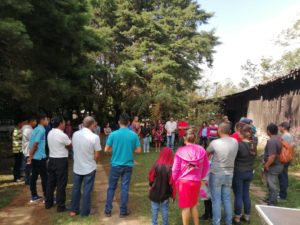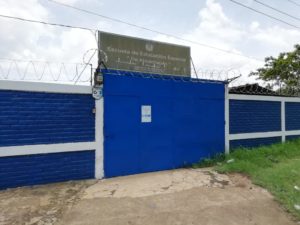Make Your Experiences Count. They Can Change the World.
LET’S BRING ALL OF OUR KNOWLEDGE AND EXPERIENCES TOGETHER.
TOGETHER WE KNOW MORE. TOGETHER WE ACHIEVE MORE. TOGETHER WE DO BETTER.
LET’S BRING ALL OF OUR KNOWLEDGE AND EXPERIENCES TOGETHER.
TOGETHER WE KNOW MORE. TOGETHER WE ACHIEVE MORE. TOGETHER WE DO BETTER.
Published: July 8, 2019
Security measures. In the end, that were the words that made it to the title. There were a few other ones that were floating through my mind: violence, homicide rate, gang crimes – these are basically the biggest problems of this country and the main reasons that make Salvadorians assume the high risks to migrate – mostly internally within their country or to the US. However, in the end I chose security measures, because that is what I have to deal with every day.
The root cause of it is violence, but it is not the case that I experience or witness murder, rapes, kidnapping or extortions every day. Of course though, these things do happen here on a daily basis. El Salvador is within the Top5 of the most violent non-war countries of the world. Those who are affected the most are the ones that can least protect themselves and don’t have any power or means to get justice for what has or is happening to them. However, the aim of this post is to make you gain an insight of how people in El Salvador deal with this issue on a daily basis, how it affects work, relationships and how people´s coping strategies look like.
Violence looks different in every barrio or corner in El Salvador. One street that is safe doesn’t mean that the next one is as well. Therefore I can only share my observations from Apaneca, the place where I and my partner happen to live. Apaneca is known to be a sleepy little town nestling on 1500m in between coffee plants, volcanos and mountains. There are a lot of tourists who come here, because of the lovely fresh climate and because you can stroll freely and without fear through the colorful main streets. During the day it seems like there is no place more peaceful than Apaneca. But that changes around 9-10pm, when you should not be on the streets anymore. You also don’t want to be there because there is nobody else around either. Every food place and pupuseria (selling torillas filled with beans, cheese etc.) is closed at that time and apart of some pentecostal churches chasing the holy spirit with their sound systems there are no noises around. The last bus runs at 6.30pm.
A bit outside of Apaneca’s main roads in the rural areas, the Maras or youth gangs gain strength and power. The worst and most violent areas in El Salvador are marked by the borders of the territories of two opposing gangs. At the moment, in Apaneca there is only one youth gang present, which makes it safer because there are no fights between the gangs here. Extortions are common with supermarkets and small businesses and people mostly adapt or accept it. Also kidnapping is a common way for Maras to receive money. I have been talking to a woman in Ahuachapan whose daughter was kidnapped and had to deliver drugs till her mother could pay for her release. They don’t have a lot of money themselves but they could loan some from their family and friends. Again the people with low incomes are the ones who suffer most from violence.

As a result of these incidents most parents try hard to protect their children and tend to have a much stronger presence or protagonism in the lives of their children as it is common in Austria for example. Since I am working with youth groups, I was very surprised at the beginning that it is very usual that parents join their teenager kids to youth events or meetings. Furthermore, before planning an event or a trip to another place with youth in El Salvador, it is very important to have a meeting with the parents to clear all the questions and – if necessary – invite them to join the trips. It is of essential importance to include parents into youth work here. Some adolescents wouldn’t be allowed to join events, if their parents wouldn’t give them permission or the bus ride alone would just be too dangerous for them. Therefore, it is very important to check all safety issues first, before planning activities with young people in El Salvador. However, due to this strong protective way of bringing up young people it is not always easy to start relationships, go out or be spontaneous for some of them. For me as a social worker coming from a very individual and open Austrian youth work, this was a very important lesson to learn.
As you can imagine, for schools this is an even bigger issue. In the beginning, entering schools was like entering a prison for me. First, you have to announce your visit beforehand per telephone and ask for permission. Once you are there, you ring the bell at the entrance till somebody asks you through the door who you are and what the reason for your visit is. Then you can enter the big iron door through the school ground that is surrounded by a thick wall and barb wire on top. A girl form Apaneca told me that in her secondary school approximately once a month there is police presence at the entrance checking everybody’s bags. Inside the schools though, life seems to be like in every other school: kids playing football in their recess, chattering students and teachers trying desperately to make them lower their volume. Good old student’s everyday life.

“The rabbit is hot”: At first, it thought it was funny anecdote when my neighbors told me that within their family they use this code phrase send on whatsapp to warn their family members that there is something going on in the village and that they shouldn’t leave the house. Reflecting on it though, it is very smart to keep each other informed and I am now very grateful that they have included us in their inner circle and alert system. It is also the neighbors that make us feel very safe here. They are always having an eye on our house and are helping us out, if we have questions – or need the number of a plumber, mechanic or doctor, because they always have a cousin or an aunt who has the exact know-how that we need and is trustworthy to enter your home.
“Don´t open your doors to everyone and watch out whom you hang out with. Make sure you know them well before inviting them.” This was an advice we were given more than once. And I have the feeling it is also an advice that people are living here more strongly than in other, safer countries in the world. In general, people are a bit more cautious when getting to know others, but after 6 months being here, I know that the ice tends to melt soon and Salvadorians can be incredibly friendly, funny and lovely people.